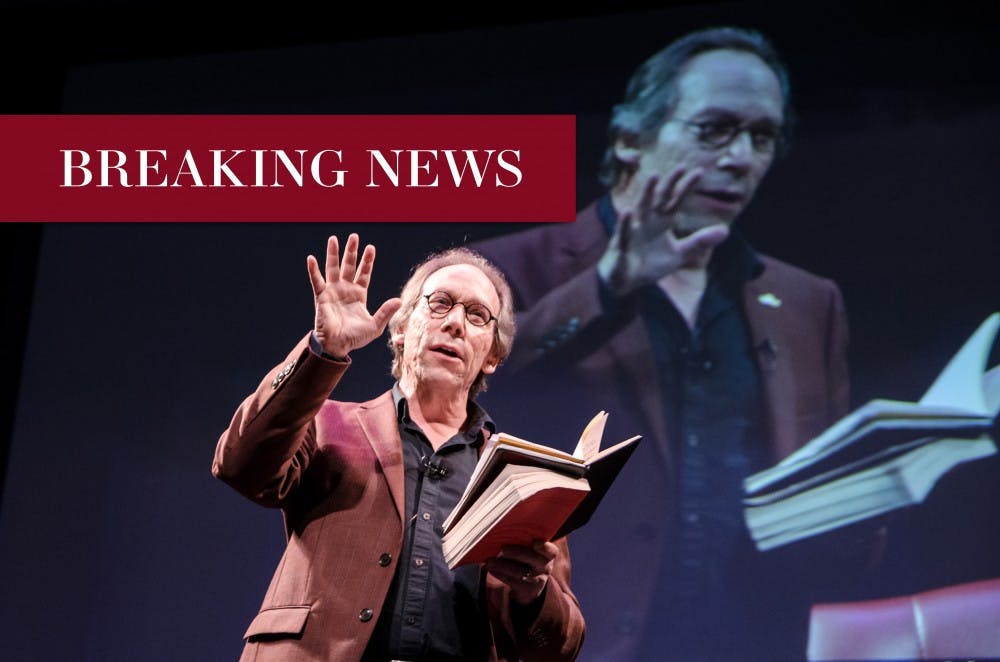Lawrence Krauss, an ASU professor and internationally known physicist accused of sexual misconduct, will be retiring from ASU in May 2019 when he turns 65, according to a statement Krauss sent to The State Press and tweeted from his personal account.
The University confirmed that it accepted his resignation early Sunday afternoon.
Krauss was first accused of sexual misconduct in a Buzzfeed report published in February 2018, and placed on paid leave soon after. In late July, ASU concluded that Krauss had violated University harassment policy during an ASU-funded trip to a convention in Australia in 2016.
Krauss denied the allegations then and in a statement today.
The University says Krauss will remain on leave until May 2019, and he will leave with whatever retirement benefits he will have accrued by the time of his retirement but no more.
Following its findings that Krauss had violated University harassment policy, ASU dismissed Krauss from his positions as the director of the Origins Project and a foundation professor at the School of Earth and Space Exploration.
During an interview with The State Press on Sept. 19, ASU president Michael Crow said that the University had dismissed Krauss from the positions over which it had “total control."
The process for dismissing tenured professors is more complex. This process was initiated in Krauss's case when College of Liberal Arts and Sciences Dean Patrick Kenney recommended his dismissal. Following this recommendation, Krauss and the University entered into a conciliation process.
The agreement on his retirement came after that process concluded, Krauss said in his statement.
He said his decision to retire in May reflects his opinion that the review process would not allow him to fairly address the allegations leveled against him.
In addition, he said that even if the outcome did allow him to remain at the University, he “would no longer encounter a working environment at ASU that is conducive to continuing my active teaching, research and service activities.”
The University disputed his claim that the process is unfair.
"Dr. Krauss’ description of our review process is inaccurate," an ASU spokesperson said in an email. "It does provide an opportunity for the person against whom allegations are made to have a hearing at which they can present witnesses and evidence in their own defense and cross-examine adverse witnesses. Should he have chosen to move forward with the review process, this would have taken place before any final decisions were made regarding dismissal."
The goal of a conciliation process is for a tenured professor recommended for dismissal and the University official who made the recommendation “to arrive at a mutually agreed upon solution.” Krauss’s voluntary retirement appears to be this solution.
If a solution had not been reached through the conciliation process, Crow would have likely reissued a notice of dismissal, which Krauss would have had the option to appeal to a faculty committee known as the Committee on Academic Freedom and Tenure. That committee holds hearings and issues recommendations to the university president regarding faculty dismissal.
A faculty member still facing dismissal after the committee process can file a request with the university president for reconsideration, and if reconsideration is denied, the faculty member can appeal to the Superior Court, according to Arizona Board of Regents regulations.
Taken as a whole, this process is lengthy and complex, demonstrating the difficulty of dismissing faculty members with tenure. However, for now, Krauss said that process has ended in his case.
Krauss again denied harassing or assaulting anyone and wrote that he has “not exhibited gender discrimination in my professional dealings at the University or elsewhere,” according to his statement.
“I look to the future for new and different challenges and opportunities,” Krauss wrote.
This story was updated at 1:31 p.m. on Sunday, Oct. 21 with comment from ASU.
Reach the reporter at maarmst7@asu.edu or follow @MiaAArmstrong on Twitter.
Like State Press on Facebook and follow @statepress on Twitter.




